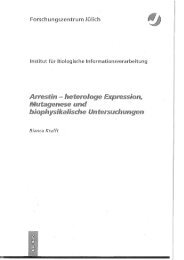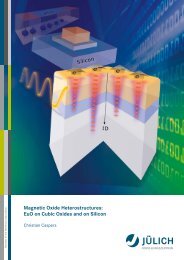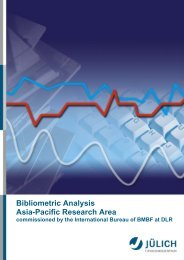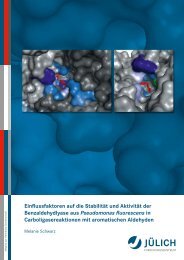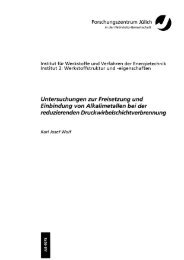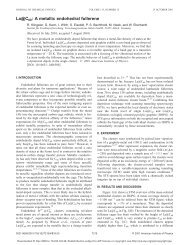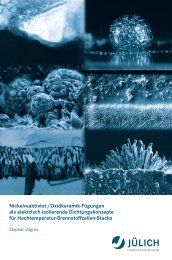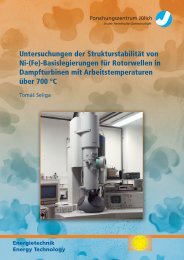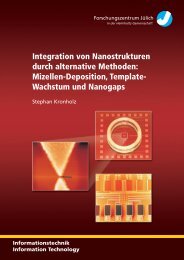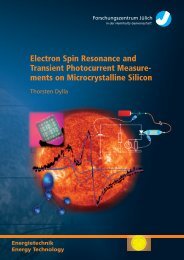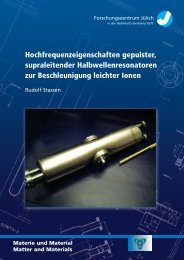- Page 1 and 2:
Forschungszentrum Jülich in der He
- Page 4 and 5:
Forschungszentrum Jülich GmbH Inst
- Page 6:
Contents . . 1 Neutron Sources H .
- Page 10 and 11:
1 . Neutron Sources Harald Conrad 1
- Page 12 and 13:
d) f, = v a, , q - ti = P a, - 0 .3
- Page 14 and 15:
Period Example Flux (D [1013 1950-6
- Page 16 and 17:
In stage 1 the primary proton knock
- Page 18 and 19:
get as heat, the rest is transporte
- Page 20 and 21:
down power and stronger absorption
- Page 22 and 23:
Appendix Neutron Sources - an overv
- Page 24:
led remotely. It is rauch more conv
- Page 28 and 29:
2 . Properties of the neutron, elem
- Page 30 and 31:
In the 60's the ferst high flux rea
- Page 32 and 33:
Hot neutrons in reactors are obtain
- Page 34 and 35:
elated values for the FRJ-2 reactor
- Page 36 and 37:
2 .5 Scattering amplitude and cross
- Page 38 and 39:
(A+k2 ) yr = u(Z:) yr V( u~r)= z "
- Page 40 and 41:
_du _ mn \2 A2-~2z r2~ I(k' IVI k)I
- Page 42 and 43:
E ô ô x z w 0 z _w U N Figure 2 .
- Page 44 and 45:
scattering is observed with the ave
- Page 46 and 47:
For a spherical electron distributi
- Page 48:
A more thorough introduction to neu
- Page 52 and 53:
3 . Elastie Seattering from Many-Bo
- Page 54 and 55:
Q = Q = k2 + k2 - 2kk' cos2B (3 .3)
- Page 56 and 57:
3 .2 Fundamental Scattering Theory
- Page 58 and 59:
The meaning of (3 .l4) is immediate
- Page 60 and 61:
1 . e. in the second approximation,
- Page 62 and 63:
The saure problem will bc dealt wit
- Page 64 and 65:
ALQ) = Y-bfe'Q'-rB(r-(n .a+m .b+p»
- Page 66 and 67:
du LQ) = ALQJ2 = e'Q .A' . * -i e-
- Page 68 and 69:
Tab . 3.1 : The scattering lengths
- Page 70 and 71:
We note immediately that we should
- Page 72 and 73:
These magnetic structures can be un
- Page 74 and 75:
M1LQ)=Q-MQ)xQ M(Q)= IM (r)e i Q " d
- Page 76 and 77:
Orbital magnetic spin angular ,,- m
- Page 78 and 79:
aQ . r 3 àQ . N . QR . aQ .t k _ML
- Page 80:
Schweika Analysis Polarization W .
- Page 83 and 84:
ducing a complex component and were
- Page 85 and 86:
ir v s ftft 3956 2 s 2 0.81[X] 80 c
- Page 87 and 88:
Some polarizers using Bragg reflect
- Page 89 and 90:
Different to the coherent nuclear s
- Page 91 and 92:
where QBG denotes the background .
- Page 93 and 94:
4 .4 Applications We now consider e
- Page 95 and 96:
Fig. 4 .3 .4 probably represents th
- Page 97 and 98:
. occur only in the non-spin flip c
- Page 99 and 100:
The results for the magnetization d
- Page 101 and 102:
a large solid angle with polarizers
- Page 103 and 104:
scattering to spin-flip scattering
- Page 105 and 106:
An experimental verification of thi
- Page 108:
Correlation Functions Measured by S
- Page 111 and 112:
In real liquids however usually an
- Page 113 and 114:
The term in big parentheses of equa
- Page 115 and 116:
4 0 -5 0 5 10 15 20 ho) [meV] Figur
- Page 117 and 118:
Figure 5 .5 : The pair correlation
- Page 119 and 120:
Figure 5 .6 : Partial differential
- Page 121 and 122:
Then equation (5 .21) can be conver
- Page 123 and 124:
The route from expression (5 .27) t
- Page 125 and 126:
In addition it is often useful to d
- Page 127 and 128:
2 . The pair correlation function h
- Page 129 and 130:
G(r, t) G(r, t) i(Q, t) r Q i(Q, t)
- Page 131 and 132:
Insertion of this result into (5 .6
- Page 133 and 134:
With this example we can also demon
- Page 136 and 137:
6. Continuum description : Grazing
- Page 138 and 139:
Starting point is the exact atomic
- Page 140 and 141:
For specular reflectivity measureme
- Page 142 and 143:
v v z l 2r V(z) = 2 -2erfC~ with er
- Page 144 and 145:
F{dV(z)/dz ) to calculate the refle
- Page 146 and 147:
Equation (6 .13) also shows that th
- Page 148 and 149:
ut is completely reflected . The cr
- Page 150 and 151:
0.4° . The full dynamical theory c
- Page 152 and 153:
1) If no magnetic induction B (whic
- Page 154:
Diffractometer Gernot Heger
- Page 157 and 158:
select a special wavelengths band (
- Page 159 and 160:
" The direction of the reciprocal l
- Page 161 and 162:
Bragg-intensities of single crystal
- Page 163 and 164:
monochromator, on the mosaic spread
- Page 165 and 166:
complex sample environments, such a
- Page 167 and 168:
the diffraction plane) two further
- Page 170:
Small-angle Scattering and Reflecto
- Page 173 and 174:
L= (1) ( k ) a e -(k/k T ) 2 Ak (8
- Page 175 and 176:
possible neutron wave lengths betwe
- Page 177 and 178:
figure and with neutrons of about 1
- Page 179 and 180:
1 .0 Danvinkurve 0 .8 0 .6 0 .4 0 .
- Page 181 and 182:
tails. This reflection curve leads
- Page 183 and 184:
For the Nickel film one gets a thic
- Page 185 and 186:
I The rotor of a velocity selector
- Page 187 and 188:
multiplier are arranged in a quadra
- Page 190 and 191:
9 . Crystal spectrometer : triple-a
- Page 192 and 193:
machine which will be followed by a
- Page 194 and 195:
10 .3 Beaur shaping Due to the fact
- Page 196 and 197:
G.k=zGz . (11) This case is fulfill
- Page 198 and 199:
tribution of bisecting planes (ntos
- Page 200 and 201:
directions which is exploited for t
- Page 202 and 203: Fig . 14) Dispersion surfaces for B
- Page 204 and 205: whereby E and v,, denote energy and
- Page 206: [1] B . N. Brockhouse, in Inelastic
- Page 210 and 211: 10 . Time-of-flight spectrometers M
- Page 212 and 213: Tnloderator /K V7 2/m/s A/nm Aiw/eV
- Page 214 and 215: 10.2 .1 Interpretation of spectra A
- Page 216 and 217: ----~ Probe ' (Chopper 2) Zeit I Ch
- Page 218 and 219: the similar intensity distribution
- Page 220 and 221: is performed without Jacobian due t
- Page 222 and 223: 10.2 .6 Crystal monochromators The
- Page 224 and 225: larger energy transfers . However i
- Page 226 and 227: 10.3 Inverted TOF-spectrometer In t
- Page 228 and 229: constant offset to the TOF . To be
- Page 230 and 231: sample size of cm and a detection p
- Page 232: Contents 10 .1 Introduction . . . .
- Page 236 and 237: 11 . Neutron spin-echo spectrometer
- Page 238 and 239: 2 0 L Tr -0 L 2 ArDet Figure 11 .1
- Page 240 and 241: initial velocity-reassemble at the
- Page 242 and 243: distribution (current sheets) that
- Page 244 and 245: esults, where il is an irrelevant c
- Page 246 and 247: 10000 - 8000 - co 6000 - C ô 4000-
- Page 248 and 249: e0 oX n .5 1 .0 1 .5 so 0 .0 0 .0 1
- Page 250 and 251: nel" coils) the required homogeneit
- Page 254: Contents 11 .1 Introduction . . . .
- Page 258 and 259: 12 . Structure determination G . He
- Page 260 and 261: Important: Thc measured Bragg inten
- Page 262 and 263: determination of accurate atomic pa
- Page 264 and 265: The knowledge of the overall occupa
- Page 266 and 267: (even anharmonic) effects. This com
- Page 268 and 269: Fig . 4 . Coordination ofthe D20 mo
- Page 270 and 271: fenoelectric phase of orthorhombic
- Page 272 and 273: (c) and (d) calculated densities at
- Page 274: 13 Inelastic Neutron Scattering Pho
- Page 277 and 278: Figurel Schematical drawing of a ge
- Page 279 and 280: equilibrium position the atom is in
- Page 281 and 282: s - ' f N .mwn .I )oo K L .~um..un
- Page 283 and 284: esults from the quantum mechanics o
- Page 285 and 286: y absorption . 13 .1 .3 Magnetic in
- Page 287 and 288: Figure 7 The plane in reciprocal sp
- Page 289 and 290: 5 100s1 [OSl ] IOSSI [SSS y i 4 0 r
- Page 291 and 292: dynamics of ionic compounds with th
- Page 293 and 294: 16 14 12 F.. . 10 ô 8 q 6 cr 4 G.
- Page 295 and 296: 21 [ooç 1 " - 19 18 17 16 "" 298 K
- Page 297 and 298: n = v - cap[i(pga . - wt)] (13 .22)
- Page 299 and 300: Y c 3 c Cc E Figure 16 Magnon dispe
- Page 301 and 302: . . 2 H . Bilz and W . Kress, Phono
- Page 304 and 305:
14 . Soft Matter : Structure Dietma
- Page 306 and 307:
length density of a sample against
- Page 308 and 309:
2 P(Q) = 1 ~exp(-Ii - j'6 Q2 ) (14
- Page 310 and 311:
fraction. In the region of large Q
- Page 312 and 313:
with the partial structure factor S
- Page 314 and 315:
and which lead to the scattering cr
- Page 316 and 317:
For the intramolecular and intermol
- Page 318 and 319:
500 450 -400 U 0 ;, 350 42, 300 s~.
- Page 320 and 321:
scaling behavior of the susceptibil
- Page 322:
15 Polymer Dynamics Dieter Richter
- Page 325 and 326:
constraints due to the mutual inter
- Page 327 and 328:
(15 .3) T ß ( E)=T ô exp E k,T -
- Page 329 and 330:
This incoherent approximation does
- Page 331 and 332:
10 an 0 2 0 Figure 15.4 : Relaxatio
- Page 333 and 334:
In order to test Eq .[15 .9] the re
- Page 335 and 336:
Arrhenius temperature dependence wi
- Page 337 and 338:
1 3kBT ~ z 2 72 2 p2 a = f2 N2 P =W
- Page 339 and 340:
S (Q,t) = 12 fdu exp ~ -u_ (S2Rt) v
- Page 341 and 342:
We now use these data, in order to
- Page 343 and 344:
c 0 .8 0 .6 00 .055 x 0 .1 110 .14
- Page 345 and 346:
small but systematic deviations fro
- Page 347 and 348:
S(Q,t) is predicted . Such a platea
- Page 349 and 350:
only one single parameter, the tube
- Page 351 and 352:
confinement of the relaxation of la
- Page 354:
16 Magnetism Thomas Brückel
- Page 357 and 358:
the ground state of metallic magnet
- Page 359 and 360:
c~ ~ o 0 `,~i) g',, b o 0 Q! b o 0
- Page 361 and 362:
only "sec" this component and not t
- Page 363 and 364:
200 ¬ 400 500 600 700 E 3 QI J (h0
- Page 365 and 366:
Fie. 16.4: Scattering geometry for
- Page 367 and 368:
0 .8 ' D3 ° Stassis 3d spin - - 3d
- Page 369 and 370:
Here, J;j denotes the exchange cons
- Page 371 and 372:
Fig. 16.8 : Contour plot of the mag
- Page 373 and 374:
0.0001 0.001 0 .01 0.1 2 Fig. 16 .1
- Page 376:
17 Translation and Rotation M . Pra
- Page 379 and 380:
17.1 Introduction Atomic and molecu
- Page 381 and 382:
17 .2.2 Diffusion, microscopic appr
- Page 383 and 384:
0.6 H20 2 x2tÄ z ) Figure 17 .2 :
- Page 385 and 386:
The scattering function of a polycr
- Page 387 and 388:
e (2) 1 (j 1, 0 > - 0,1 >), respect
- Page 389 and 390:
leads to the eigenvalue problem ~q
- Page 391 and 392:
allow a good determination of the E
- Page 393 and 394:
m Eu W Figure 17 .7 : Eigenenergies
- Page 395 and 396:
-so o so Energy transfer (NeV) Ener
- Page 397 and 398:
Bibliography [1] T. Springer, Quasi
- Page 400 and 401:
18 . Texture in Materials and Earth
- Page 402 and 403:
Further important structure related
- Page 404 and 405:
The axes of the cartesian Kp coordi
- Page 406 and 407:
4.0 Experimental Texture Analysis T
- Page 408 and 409:
Fig. 18.14: Variation of reflection
- Page 410 and 411:
measurements can be performed in tr
- Page 412 and 413:
Apart from the global description o
- Page 414 and 415:
In the following, two experimental
- Page 416 and 417:
The neutron diffraction pole figure
- Page 418 and 419:
dependent pole densities, and (4) g
- Page 420 and 421:
Schriften des Forschungszentrums J
- Page 423:
Forschungszentrum Jülich in der He



